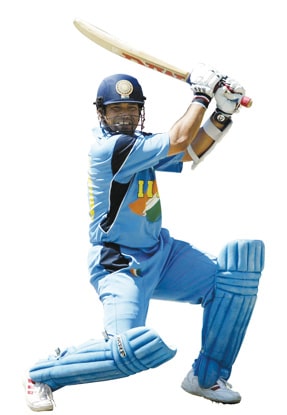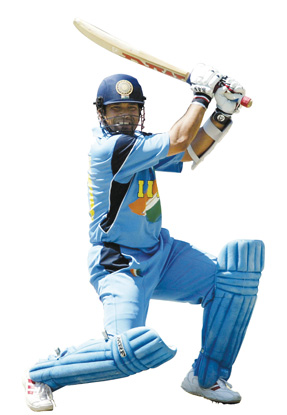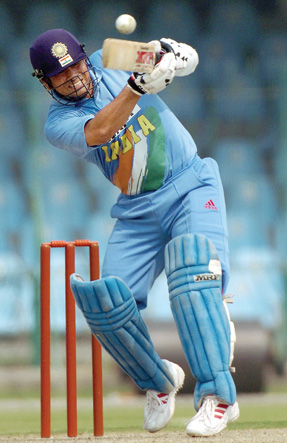Magazine
The Politicization Of Sachin Tendulkar?

An unusually pointed and forthright - and not entirely off-the-cuff - remark from the Little Master caused a near-riot and considerable heartburn in Mumbai's political circles.
| After exactly two decades of basking in the international cricket limelight and managing to stay away from controversy with a peculiar mix of feigned naivete and self-conscious professionalism, Sachin Tendulkar came out of the closet – as it were – and last month executed a “late cut” that pricked the inflated political ego of at least one veteran local leader, Shiv Sena’s Bal Thackeray. Is our pet-next-door showing traits of a political animal in the making?
For a cricketer who normally lets his bat do the talking, Tendulkar had truly gone out on a limb to speak out unequivocally against Thackeray’s son-of-the-soil ideology. It was a gutsy stroke, and as usual left the opposition momentarily stunned and gaping. But it also quite unwittingly set in motion a series of events that culminated (or so it seems at the time of writing) in an ugly near-riotous fracas. More than a dozen Shiv Sena goons, carrying clubs and hockey sticks, smashed the furniture and equipment in the offices of a television channel critical of Thackeray and manhandled the staffers, some of whom were women. Stated reason: they were miffed that the channel head, a known Thackeray baiter, had gone to town ridiculing the Sena chief over Tendulkar’s statement.
That statement and the goon attack are both couched in an acutely politicized context. Tendulkar, to be sure, was not speaking at a political rally. He was in fact responding to media queries at the celebration of his 20 years at the pinnacle of international cricket. Responding to a question on Maharashtrian pride, Tendulkar replied: “I am a Maharashtrian and I am extremely proud of that. But I am an Indian first. And Mumbai belongs to all Indians.” It was doubtless the verbal equivalent of a stinging slap on the face of the cynical parochialism that has plagued the politics of Mumbai city and Maharashtra state since the birth of the Shiv Sena in the mid-1960s. This brand of intimidatory fascism – backed by lumpen elements – again raised its head recently when the Shiv Sena lost its clout among the Marathi-speaking middle-class, long considered its faithful ally and unwavering votary. The state assembly elections in October proved that the much-publicized split in the Sena family – patriarch Thackeray’s estranged nephew Raj leaving the fold to float his own Maharashtra Navnirman Sena – was fatal to the Sena’s electoral fortunes. The MNS effectively split the Marathi vote to emerge as a minor power-broker among mainstream parties, and – more importantly – to render the parent Sena weak and depleted. Curiously however, both the Shiv Sena and the MNS feed off the same issues, centering largely on the perceived discrimination and marginalization of Maharashtrians in their own state because of large-scale influx of migrant labor from Uttar Pradesh and Bihar. Raj Thackeray took the battle to Amitabh Bachchan’s northern origins and whipped up local resentment against the Bollywood superstar for investing in projects in Uttar Pradesh and for appearing in television commercials publicizing the state’s rural development. And when MNS legislators physically assaulted another UP-born legislator on the floor of the Maharashtra Assembly for taking his oath in Hindi and not in Marathi, it was clear that the nephew had learnt his uncle’s lessons only too well, that the new kid on the block was one up on the aging veteran.
Fearful that Raj was stealing his thunder and worse, demoralizing his cadres and decimating his party’s influence on public issues, Uncle Bal pounced on the next available target. It was his misfortune that it happened to be a cricketing god and his own erstwhile neighbor from the Mumbai suburb of Bandra whose batting exploits he had often praised in fond terms. But political imperatives outweighed personal predilections when the Sena honcho, in a signed editorial in party newspaper Saamna, gave Sachin Tendulkar a history lesson on the sacrifices made by Marathi activists in the 1950s to secure the formation of their own state with Mumbai as its capital – “you were not even born then” – and concluded the diatribe with a veiled warning to the star batsman: “If you use your tongue as a bat to hit boundaries against the Marathi manoos (Marathi person), we will never tolerate it. So whatever you have earned on the cricket pitch, please don’t lose it on the ground of politics.” The backlash against Bal Thackeray was telling: he was roundly criticized by opinion leaders in every field – and not just politics. So telling in fact, that his lieutenants were constrained to issue statements downplaying the outburst as “affectionate fatherly advice.” Raj, on the other hand, has so far maintained a conspicuous silence on the Tendulkar statement. Is he waiting to make the next move, or will he pass an opportunity to score a brownie point for the Marathi cause because Sachin Tendulkar is known to be his personal friend?
It is tempting to infer that Tendulkar is but a pawn in this political chess game, a victim of competing chauvinism, caught in the crossfire between two coarse-mouthed tribal chieftains on either side of the generational divide. After all, Sachin has never in the two decades since he became an international sports celebrity and later came of age as a citizen, husband and father, made a single statement on any politically sensitive issue that one can recall. Early in his career, probably at the ill-advised suggestion of a mentor, he is said to have very hesitatingly endorsed a candidate in a local election. But the endorsement was too measly and half-hearted to merit the tag of political activism or even discernable public interest. Moreover, the man who has earned billions hawking consumer products on the back of his star value has not once – that is, before his Mumbai-for-Indians remark – deployed his star power to champion a major public cause or to express his commitment for or against any policy affecting the lives and rights of his fellow citizens. Unlike his idol and well-wisher Sunil Gavaskar who single-handledly braved the wrath of a Hindutva-charged mob of Shiv Sainiks to protect the Muslims near his residence during the 1992 Mumbai riots, Sachin Tendulkar has never uttered a word denouncing the state-sponsored progrom openly orchestrated by Chief Minister Narendra Modi during the Gujarat riots of 2002. Even his support for a cause has been, at best, vague and equivocal. When the Beijing Olympic torch travelled through India, Sachin and footballer Baichung Bhutia were requested by Tibetan activists to refrain from carrying it. Bhutia instantly agreed and made his non-cooperation loud and clear. Sachin, in withering contrast, hohummed till the last minute, and then backed out of the torch relay citing a groin pull. He has however used his stardom to extract small – by his financial standards – and rather unseemly favors from officialdom. He lobbied, albeit unsuccessfully, to get the customs duty on his imported Ferrari waived through the office of a fellow Maharashtrian, the late Pramod Mahajan who was then a federal minister. The effort was botched by a public-interest litigation challenging the waiver. Similarly, Tendulkar is rumored to have pulled strings to dereserve a plot of land, originally earmarked for a home for the homeless, to build his own bungalow. So is his latest statement a mere flash in the pan? I think not. It may have come late, but it is – for me – an unmistakable sign of a maturing Tendulkar. He may not reach the heights of a Mohammed Ali who risked a jail term to protest the Vietnam War, and he may not turn out to be as active as two other Indian sportsmen in the country’s political arena – Jaipal Singh, who led our hockey team to a gold medal at the 1928 Amsterdam Olympics and later became a leader for the Jharkhand cause; and Maharashtra’s own Palwankar Baloo, a Harijan cricketer who mediated between Dr.Ambedkar and Mahatma Gandhi. But I suspect – and predict – that we may see a relatively more active, or least a more vocal Tendulkar in the future. He need not stand for elections to make his point. And there may be times when his silence may be more evocative than anything he speaks. Few noticed, for instance, that when he received the customary “20-year” memento from Narendra Modi during the recent Ahmedabad Test against Sri Lanka, Tendulkar refrained from even the most routine and polite of gestures – a smile – and instead had a steely glint in his eyes. His grim countenance and cold demeanor was, for me, a loud enough political statement. |




You must be logged in to post a comment Login